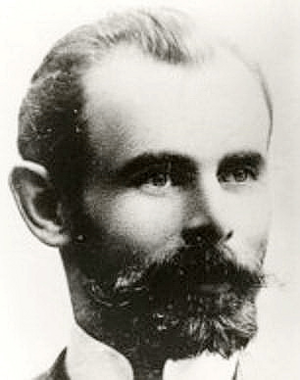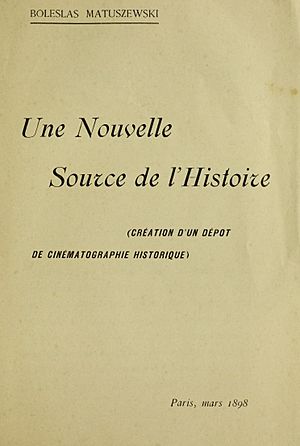Bolesław Matuszewski facts for kids
Bolesław Matuszewski (born August 19, 1856, died around 1943 or 1944) was a Polish businessman, photographer, and cameraman. He was a true pioneer in the world of film, especially in making documentary films. He helped show how movies could be used to record history.
Early Life and Film Beginnings
Bolesław Matuszewski was born in 1856 in Pińczów, a small city in Poland. At that time, Poland was divided among other countries. Pińczów was part of the Russian Empire.
His father, Aleksander, was a French translator. His mother was Stanisława Pochowska. Bolesław had two sisters and a younger brother named Zygmunt.
Bolesław learned French very well from his father. In the 1880s, he moved to Paris, France, to study. While there, he became very interested in photography and early film.
He started working for the famous Lumière company. The Lumière brothers were inventors who created one of the first movie cameras and projectors. Matuszewski became an active photographer and cameraman. He was also a member of a photography club called "LUX."
Bringing Film to Poland
In 1895, Matuszewski returned to Poland with his younger brother, Zygmunt. They opened a photography studio in Warsaw at Marszałkowska Street 111. Their studio soon became a company called Lux Sigismond et Comp.
Between 1897 and 1899, Matuszewski's company worked with a Polish weekly magazine called „Tygodnik Illustrowany”. The company continued to operate until 1908. During this time, they created many documentary films and photographs.
A Film That Changed History
In 1897, Bolesław Matuszewski became the official photographer for Tsar Nicholas II of Russia. This was a very important job.
He used the Lumières' Cinématographe camera to record a special event. This was the official visit of the French President, Félix Faure, to St. Petersburg, Russia.
After the visit, a powerful German leader, Otto von Bismarck, made a serious accusation. He claimed that President Faure did not show respect by taking off his hat when he saw the Russian flag. This was a big deal because it could have caused problems between France and Russia.
However, Matuszewski's film proved Bismarck's accusation was false. The film clearly showed President Faure respectfully removing his hat. This event showed how important documentary films could be. They could record events accurately and even settle disagreements. Matuszewski's work helped prove that films could be a reliable way to record history.
 | Misty Copeland |
 | Raven Wilkinson |
 | Debra Austin |
 | Aesha Ash |



